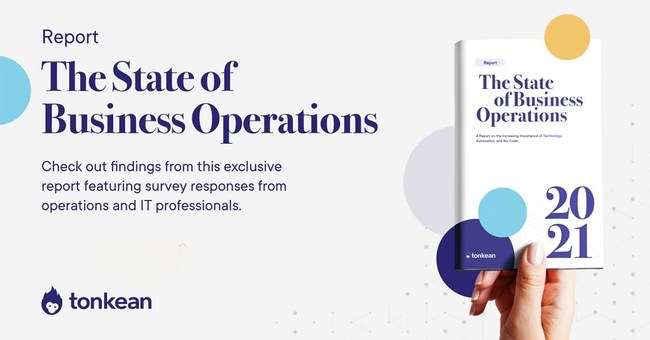Survey Reveals Increasing Importance of Business Operations, Automation, and No-Code
- Study From Tonkean & Lucid Reveals 95% of It & Ops Teams Have Already Adopted or Will Soon Explore Using No-Code/Low-Code Tools
Tonkean, the operating system for business operations, announced the results of its “State of Business Operations” study conducted in partnership with Lucid, which revealed the increasing value that enterprises place on business operations. More than 95% of respondents indicated that business operations has become a more important function in their organization in the past year.

The survey of 500 IT and business operations professionals at large and mid-sized companies, fielded in November of 2020, also showed growing frustrations with the status quo of resources and tools to perform operations work. 86% of respondents said their projects at least occasionally get delayed because of a lack of technical resources, and only 24% believed their current toolset satisfies all their needs.
Recommended AI News: Star Alliance Expands Strategic Partnership with TCS to Deliver Enhanced Customer Experiences
There is hope for significant improvement on the horizon, however. 68% of IT respondents reported an increase in their budget last year to address operational inefficiencies, and large majorities of both IT (88%) and operations (75%) professionals expressed optimism that no-code/low-code tools would empower their operations team to get more work done. Investment in those tools is already underway: 95% of respondents reported that they have already adopted or will soon explore using no-code/low-code tools.
“The tumult of 2020 has illuminated the importance for companies to build operations that are dynamic and adaptive, and the danger of sticking with processes that are incapable of withstanding abrupt changes in circumstance,” said Sagi Eliyahu, CEO and co-founder of Tonkean. “These survey results reflect what we’ve seen inside the most forward-thinking enterprises: there is much more investment in automation, no-code/low-code, and AI/ML tools to drive more flexibility, scale processes, and meet people where they work.”
Recommended AI News: Neustar Announces Additions to Executive Leadership Team
Other findings from the survey included:
- The biggest barriers to improving processes included limited budgets (63%), change management issues (56%), lack of time (51%), access to IT/engineering resources (49%), and a lack of tools (47%).
- 74% of IT respondents have developers or engineers on their team to build software or write code for operations workflows. Only 45% of ops respondents have the same access to developers or engineers.
- 33% of respondents have already invested in no-code/low-code tools to become more self-sufficient without engineering resources. 45% are actively seeking no-code/low-code tools for this purpose, and 16% say they expect to seek these tools within the next 12 months. Only 5% said they don’t expect their organization to adopt no-code/low-code tools soon.
- 82% of IT respondents said there were too many software apps being used in their business. Ops respondents see things differently: only 52% agreed there were too many software apps, while 33% disagreed.
- IT teams mostly choose to build solutions for their operational challenges (47% build, 26% buy, 27% mix of build and buy) while ops professionals tend to buy software solutions (37% buy, 38% mix of build and buy, only 25% build).
- As noted above, only 24% of respondents said their current tech stack satisfies all their operational needs. 56% said their tools support most of their needs, 16% said only some of their needs are met, while 2% said only a few of their workflows are supported.
- 87% of IT and 73% of operations respondents said automation is becoming more important in their organization in the face of Covid-19.
Tonkean’s “State of Business Operations 2021” report includes the full results of the survey, and insights on how organizations are leveraging no-code tools for process orchestration to reduce operational inefficiencies. Tonkean will also be hosting a webinar on February 4th to discuss the results of the survey and their implications for investments in business operations.
Recommended AI News: Voyager Digital Announces Assets Under Management Crossed USD$500 Million







